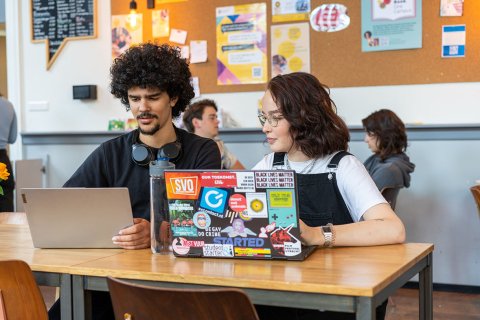Study programme
The research Master's programme Linguistics comprises two years (120 EC). Each year is divided into two semesters, running from September until January and from February until June. A semester is divided into two study periods.
Curriculum
The programme consists of the following components:
- six compulsory foundations courses and the research seminar (35 EC)
- six electives in different subfields of linguistics (30 EC)
- participation in two LOT Summer or Winter Schools (10 EC)
- internship in an ongoing research project (15 EC)
- Master’s thesis (30 EC)
Check the study schedule (PDF).
Year 1 | Foundations courses and electives
The foundations courses combine broad knowledge of the main areas of the field with methodological training. The electives take the form of seminars that teach communication, timekeeping and scientific integrity alongside advanced knowledge of current scientific issues and specialized research skills.
Year 1 | Colloquia and workshops
In order to strengthen your embedding in the Utrecht Institute of Linguistics, you will participate in the colloquium throughout your first year. You are also welcome to attend reading groups and the EMLAR (Experimental Methods in Language Acquisition Research) workshops, both primarily intended for PhD students, but open to participation by keen Linguistics Master’s students.
Year 1 | Summer and winter schools
The Netherlands National Graduate School of Linguistics (LOT) organises Winter and Summer Schools. After one semester, you will participate in the courses for first-year research Master's students of the LOT winter school. At the end of the first year, you will take courses from the general programme of the LOT Summer School.

Year 2 | Internship and thesis
For the internship, you will join an ongoing research project of your choice. You will learn how research is carried out, what the various roles of different participants are, and how actual research comes about by a combination of individual and team effort. The Master’s thesis reflects individual research.
Research topics
- first- and second-language acquisition, bilingualism, and bilingual acquisition
- linguistic databases, corpora, and online tools
- origins of speech and language disorders, and research into potential treatments
- language use in areas relevant to the general public (primary/secondary schools, and professional communication)
- phonological, syntactic, semantic, and pragmatic research underpinning all of these fields
All senior Institute for Language Sciences researchers are available for the supervision of internships and theses. Their research topics range from minimalist syntax, optimality-theoretic phonology, and model-theoretical semantics via bilingual acquisition and language in the brain to sociolinguistics, discourse coherence and communication.

Educational methods
- seminars
- individually tutored study
- internship
- practicals (for experimental and computational research techniques)
- group work
Internship
The internship enables you to acquire hands-on experience with linguistics research in an ongoing project headed by a senior researcher. The aim is to practice research, academic and communicative skills that you have been equipped with during the programme and to prepare you for carrying out your own research in the RMA thesis.
Examinations
- exams (only in foundations courses)
- individual assignments
- papers
- presentations
- experimental design/corpus queries (methods assignments)
- scientific paper (internship/thesis)
- report (internship)
Extra opportunities
For students looking for an extra challenge in addition to their Master's, there are several options. Utrecht University offers several honours programmes for students looking for an extra challenge. Honours education is followed on top of your regular Master's programme and goes beyond the regular curriculum. Honours programmes are available at interdisciplinary level and allow you to work on projects that transcend your own discipline.

